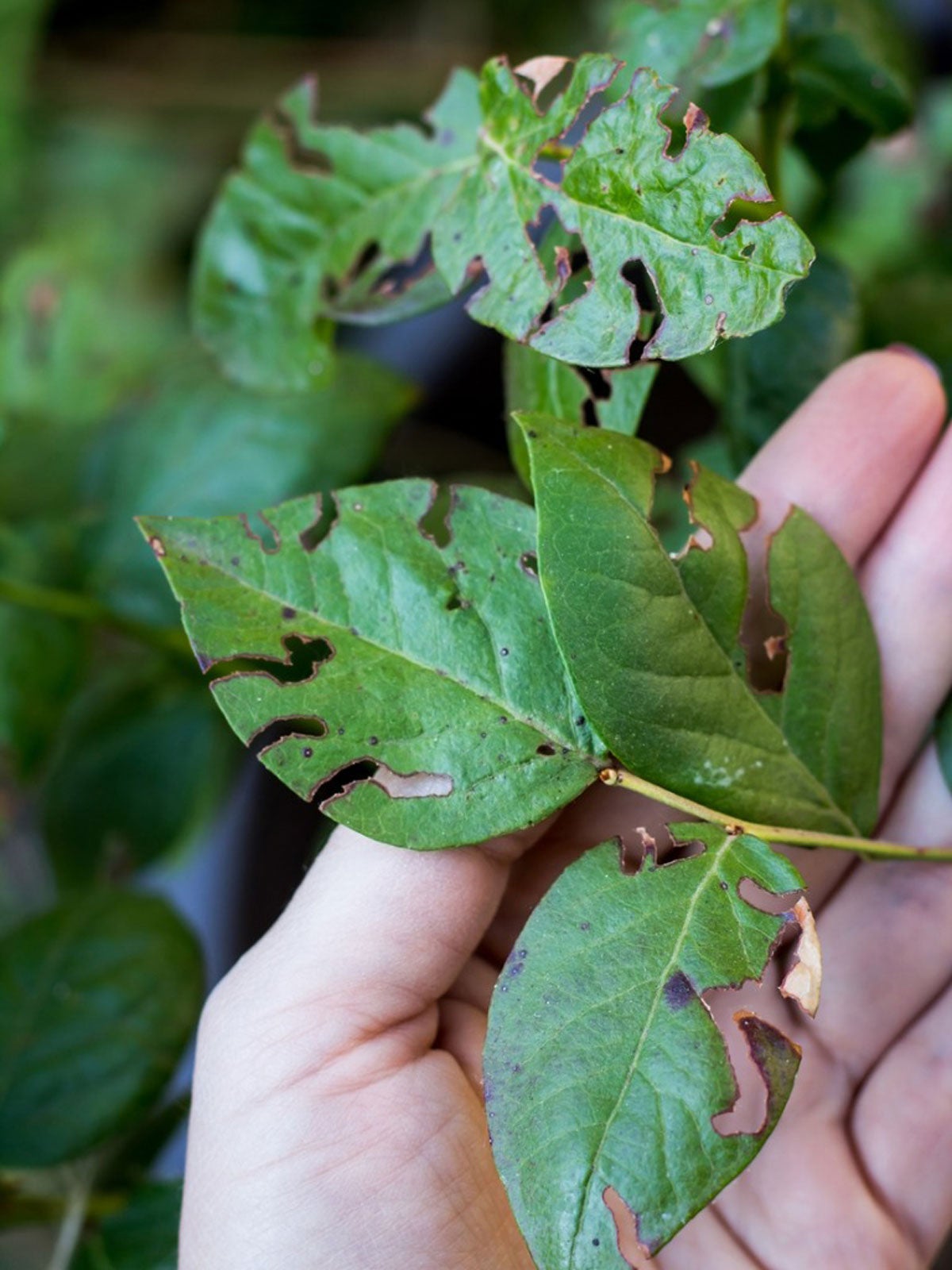Pest Damage On Blueberries – How To Control Blueberry Pests


Blueberries are delicious to us; unfortunately, a host of insect pests enjoy the plant too. Bugs on blueberry bushes can destroy the crop and diminish the plant's health. It is important to look frequently for pest damage on blueberries and take appropriate steps immediately. Continue reading to learn more about blueberry pest control and protect your tasty harvest.
Foliar Pest Damage on Blueberries
There is a long list of blueberry insect pests that damage fruit, shoots, leaves, flowers, and roots. The list is so long, in fact, it is actually overwhelming.
Oriental beetles attack roots, their damage is hard to see above ground and often deadly by the time you do see it. Other bugs on blueberry bushes are easier to see and, therefore, easier to control.
The flea beetle bothers all sorts of plants. Its damage appears as small shot holes in leaves. Floating row covers and applications of neem oil can control these insects.
The Japanese beetle skeletonizes leaves. Parasitic nematodes can help kill overwintering larvae in soil, while neem oil, row covers, and hand picking can reduce the adult population.
Thrips stipple foliage, making leaves curl and distort. Prune off infested areas. Sticky traps and applications of neem oil or insecticidal soaps can help prevent most pest damage.
Some other common foliar pests are:
Gardening tips, videos, info and more delivered right to your inbox!
Sign up for the Gardening Know How newsletter today and receive a free copy of our e-book "How to Grow Delicious Tomatoes".
- Aphids
- Blueberry tip borer
- Scale
- Sharp-nosed leafhopper
- White marked tussock moth
- Gypsy moth
- Blueberry gall midge
- Blueberry stem gall wasp
How to Control Blueberry Pests on Flowers and Buds
Mites can be hard to see, but if you put a piece of white paper under a stem and shake it, you can observe tiny black specks. Horticultural soap is helpful.
Cutworms and spanworms nibble around buds and can take off the entire flower in one night. Go out at night with a flashlight and hand pick these icky creatures.
Blueberry blossom weevil is a small, dark, rusty beetle with white flecked wings and a snout. During warm spring days, shake the stems to remove the weevils. It is important to scout frequently for these insects, as their damage to flowers can reduce the berry yield significantly.
Blueberry Insect Pests of Fruit
If you have successfully fended off the above pests, you will have your work cut out for you once fruit forms. Rodents and birds will feed off the plant as well as numerous insects.
The blueberry maggot is the offspring of a fly which lays its eggs in the developing fruit. The larvae will eat the berry from the inside out. Use a low residue pesticide every seven to ten days if you spot rotten fruit.
Fire ants love blueberries. They eat the fruit but don't do much damage. They may even be beneficial, eating other insect pests.
Cherry and cranberry fruit worms live in and eat fruit. Remove debris around the plant where they can overwinter and apply a pyrethrum spray. Encourage natural predators and apply recommended methods to protect your crop.
Even more pests include:
- Spotted wing drosophila
- Three lined flower beetles
- Plum curculio
- Stink bug

Bonnie Grant is a professional landscaper with a Certification in Urban Gardening. She has been gardening and writing for 15 years. A former professional chef, she has a passion for edible landscaping.
-
 Looking For Plants To Give You The Soft And Fuzzies? Try These 5 Fuzzy Leaf Plant Options
Looking For Plants To Give You The Soft And Fuzzies? Try These 5 Fuzzy Leaf Plant OptionsLovers of texture, drama, silver foliage and tactile plants will adore these special sensory garden additions. These fuzzy leaf plant options will leave you all aglow
By Susan Albert
-
 Get Ready For A Summer Of Hummers! Grow These Full Sun Hummingbird Plants and Flowers
Get Ready For A Summer Of Hummers! Grow These Full Sun Hummingbird Plants and FlowersIf you’re lucky enough to enjoy a sunny backyard, make sure you are maxing out on your pollinator opportunities and grow these full sun hummingbird plants and flowers
By Tonya Barnett